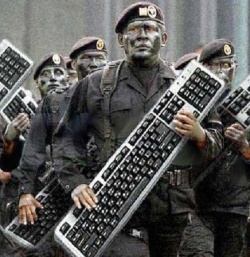"Cyberwarfare"
(plastic word) | |
|---|---|
 | |
| Interest of | • Association of Old Crows • Below Gotham Labs • Fred Chang • George Eliason • Global Commission on the Stability of Cyberspace • Joel Harding • Chris Quick • Rian van Rijbroek • The 77th Brigade |
Not to be confused with "cyberterrorism", which is a behaviour of non-state "terrorists".
Cyberwarfare is a plastic word used to promote fear, uncertainty and doubt. It generally involves the hacking of enemy computer systems and networks, but since the rise of social media has an added information or propaganda element to influence foreign audiences, and affect adversary and enemy decisionmaking.[1] The formation of groups like The 77th Brigade and Integrity Initiative, however, attest to the fact that any and all audiences are a target.
Contents
5D
The objectives in cyberwar usually include one or more of the “5 Ds”: deny, degrade, disrupt, deceive, and/or destroy.[2]
Information operations
Information operations (IO),[3] or Inform and Influence Activities are closely linked to Cyberwar. Sometimes these are having overlap with Psyops. IO is defined by the US military as “the integrated employment, during military operations, of information-related capabilities in concert with other lines of operation to influence, disrupt, corrupt, or usurp the decision-making of adversaries and potential adversaries while protecting our own.” This could mean among other things: spreading of false information, impersonation, denying network access (Internet/local) and destruction of hardware. The former two more are in the range of IO, the later two in the range of cyber attacks/war.[4] In other words, "IO can be performed in any domain, including cyberspace. An airplane dropping leaflets with a message aimed to influence an audience is conducting IO (psychological ops) without using cyberspace. Similarly, operations in cyberspace are not limited to IO. Manipulating an enemy airport computer system to disable the fuel pumps is a cyberspace operation, but not an example of IO".[5]
Integrity Initiative
- Full article: Integrity Initiative
- Full article: Integrity Initiative
There are two leaked documents from the II in 2016, which have argued that a focus for the government should be the recruiting of school children to remain ahead of the competition in the cyber space domain.[6][7]
To foster a world-leading reservoir of potential cyber talent among children and young people (initially 12-18 year olds, but spreading to younger children as the programme evolves).
GCHQ in schools
In 2020 Matt Kennard for Declassified UK reported that GCHQ tries to recruit school children from the age of four years and up,[8] offering lessons on how to hack passwords and vulnerable machines, and how to spy on other children’s wifi traffic. The Cyber Schools Hub programme was set up in 2017 and “seeks to give young students the space and the opportunity to excel and explode into the market of cyber security and innovation”.[9]
Purposes
Bill Blunden opines that "the gilded hyperbole of Cyberwar being peddled to the public is dangerous because it distracts us from focusing on actual threats and constructive solutions."[10]
Examples
| Page name | Description |
|---|---|
| HBGary | Company that developed sophisticated software for the control of sock puppets. |
| Russia/Cyberwarfare | |
| Stuxnet | A production of the NSA and Unit 8200 installed with AIVD help, designed to sabotage Iranian efforts to develop nuclear weapons. |
Related Quotation
| Page | Quote | Author |
|---|---|---|
| Matthijs Veenendaal | “Trust is a key foundation of a well-functioning society. Without reliable communication, organizations cannot operate effciently, be they corporations or government institutions. Malicious actors are aiming to exploit vulnerabilities in communication flows. With the advent
of new technology, it is possible for adversaries to impersonate leaders and create false impressions among population. The Tallinn based NATO Cooperative Cyber Defence Centre of Excellence will organize a session focusing on questions including: What is at stake? What can nations do to enhance and protect trust in democratic institutions? Or is it already too late?” | Matthijs Veenendaal |
Related Documents
| Title | Type | Publication date | Author(s) | Description |
|---|---|---|---|---|
| Document:CyberGuardian Cyber Security Education Programme for Children and Young People | brainwashing concept paper | 30 January 2016 | Integrity Initiative | II puts lots of thought into how the military can train British children for cyberwarfare. |
| Document:Executive Summary Cyber Security Education Programme for Children and Young People | brainwashing concept paper executive summary | 26 February 2016 | Integrity Initiative | II sums up its thought on how the military can train British children for cyberwarfare |
| Document:The Terrorists Among US- Traitors and Terror 3 | article | 21 June 2019 | George Eliason Michael Jasinski | George Eliason interviews professor Michael Jasinski about the dire effects of outsourcing intelligence gathering and information dissemination. |
| File:Manufactured consent and cyberwar.pdf | Conference Proceedings | June 2010 | Bill Blunden | |
| File:US Psychological Warfare in Ukraine Targeting Online Independent Media Coverage.pdf | article | 20 March 2015 | George Eliason | Cyberwarfare operations are getting targeted at anyone. |
References
- ↑ https://web.archive.org/web/20150912000739/https://publicintelligence.net/information-operations-are-now-inform-and-influence-activities/
- ↑ https://www.wired.com/beyond-the-beyond/2019/04/deny-degrade-disrupt-deceive-destroy/
- ↑ https://defenseinnovationmarketplace.dtic.mil/wp-content/uploads/2018/02/12102012_io1.pdf saved at Archive.org
- ↑ https://www.mitre.org/sites/default/files/publications/characterizing-effects-cyber-adversary-13-4173.pdf saved at Archive.org
- ↑ https://apps.dtic.mil/dtic/tr/fulltext/u2/a503117.pdf
- ↑ https://wikispooks.com/wiki/Document:Executive_Summary_Cyber_Security_Education_Programme_for_Children_and_Young_People
- ↑ https://wikispooks.com/wiki/Document:CyberGuardian_Cyber_Security_Education_Programme_for_Children_and_Young_People
- ↑ https://www.dailymaverick.co.za/article/2020-06-02-revealed-the-uks-largest-intelligence-agency-is-infiltrating-british-schools/ saved at Archive.org saved at Archive.is
- ↑ https://www.dailymaverick.co.za/article/2020-06-04-revealed-veterans-of-the-uk-militarys-cyber-warfare-unit-are-teaching-school-children-how-to-launch-cyber-attacks/ saved at Archive.org saved at Archive.is
- ↑ File:Manufactured consent and cyberwar.pdf